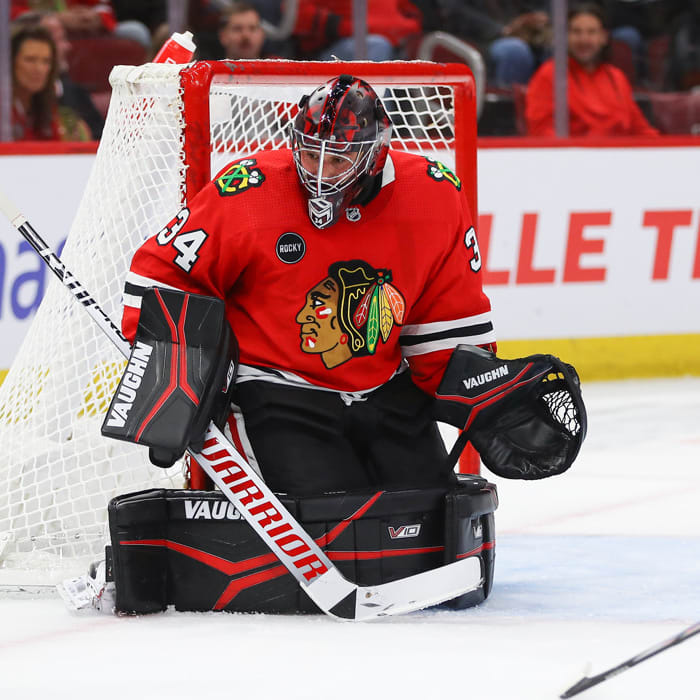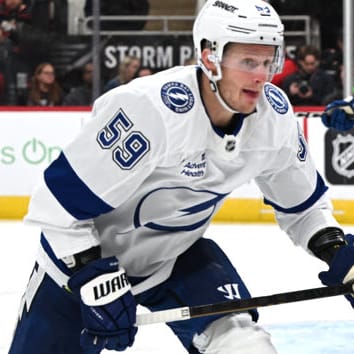This article is part of our The Kids' Table series.
It's 2016! Happy New Year to everyone out there in hockey land, and I hope you weren't as fuzzy as I was to start things off. Thankfully, the fuzziness has subsided and we're back for the first Kids' Table of the new year. But instead of switching things up, we remain focused on the World Junior Championship, which offered a pretty incredible finnish a few days ago... get it? No? Okay, I'll see my way out.
Anyway, host country Finland won in exciting fashion on Kasperi Kapanen's golden goal in overtime to defeat Russia, 4-3. It's the second time the Finns have won gold at the WJC in the past three years, which gives us a nice glimpse of what to expect from their prospects once they make the jump to the NHL. On top of winning gold, Finnish stud Jesse Puljujarvi captured tournament MVP as well as best forward honors. The kid is really special, but we'll get into that a bit more below.
On the opposite end of the spectrum we have Canada, which had one of its poorest showings in a WJC to date, considering how much talent was on the roster. The Canadians managed to score just 18 goals over the course of five games, which would be a decent clip in the NHL, but way below average in a tournament like this. They did a terrible job killing penalties and were even less of a threat to score at even strength. Sure, some of
It's 2016! Happy New Year to everyone out there in hockey land, and I hope you weren't as fuzzy as I was to start things off. Thankfully, the fuzziness has subsided and we're back for the first Kids' Table of the new year. But instead of switching things up, we remain focused on the World Junior Championship, which offered a pretty incredible finnish a few days ago... get it? No? Okay, I'll see my way out.
Anyway, host country Finland won in exciting fashion on Kasperi Kapanen's golden goal in overtime to defeat Russia, 4-3. It's the second time the Finns have won gold at the WJC in the past three years, which gives us a nice glimpse of what to expect from their prospects once they make the jump to the NHL. On top of winning gold, Finnish stud Jesse Puljujarvi captured tournament MVP as well as best forward honors. The kid is really special, but we'll get into that a bit more below.
On the opposite end of the spectrum we have Canada, which had one of its poorest showings in a WJC to date, considering how much talent was on the roster. The Canadians managed to score just 18 goals over the course of five games, which would be a decent clip in the NHL, but way below average in a tournament like this. They did a terrible job killing penalties and were even less of a threat to score at even strength. Sure, some of the more elite names showed up, but the supporting cast and goaltending just didn't provide enough, well, support to help get past elite squads like Sweden and the United States.
Anyway, I haven't really done many rankings pieces, so this should be fun, as many of the prospects who performed in Helsinki should be highly touted in deep dynasty formats.
Forwards
1. Auston Matthews, United States
Stats: 7 goals, 4 assists in 7 games
I know, figured I'd throw a curveball at you right out the gate. I've got Matthews ahead of Puljujarvi simply because of his pedigree and position. It's easier to project a U.S. center with a well-rounded game than a big Finnish forward who is still relatively young and raw. If you're looking at the No. 1 overall selection in your rookie draft for next season, Matthews has a better shot at overall NHL success.
2. Jesse Puljujarvi, Finland
Stats: 5 goals, 12 assists in 7 games
Still, Puljujarvi's tournament should not go overlooked, of course. He put on an offensive display with linemates Patrik Laine and Sebastian Aho, and was on pace for a record-setting tournament. As I mentioned above, Puljujarvi is still young and raw, so you should temper your expectations a bit, but there's no denying that he has an immense amount of talent. If you're shored up at the center position and some poor soul lets Puljujarvi drop out of the top three, you know exactly what to do.
3. Mitch Marner (Maple Leafs), Canada
Stats: 4 goals, 2 assists in 5 games
Marner was one of the few bright spots for Canada in the entire tournament. He showed his ability to be a gamebreaker and flashed a lot of the skill that has warranted comparisons to Patrick Kane. Maple Leafs prospects dominated this tournament, and we should see Marner in blue and white next season, whether that means a brief stint in the AHL or jumping right onto the Air Canada Centre ice.
4. Patrik Laine, Finland
Stats: 7 goals, 6 assists in 7 games
It's obviously hard to tell if some prospects are seeing their play lifted by the ones surrounding them, so we have to be careful with Laine, though chances are he'll turn into a very solid winger at the next level. He possesses good size and concentration, which should really help him compete in the NHL. Laine raised his draft stock a lot in this tournament, so there's a chance he gets picked a bit earlier in June, which could provide him with a chance to make an NHL roster out of camp as a rookie.
5. Matthew Tkachuk, United States
Stats: 4 goals, 7 assists in 7 games
It's an interesting debate whether the Puljujarvi-Laine duo was more dynamic at the tournament than Matthews and Tkachuk, who led the U.S. team to a bronze medal in their first taste of the WJC. Tkachuk is another name expected to be called early at the 2016 NHL Draft, and he could potentially stick with whoever drafts him past the nine-game mark that would see his entry-level deal kick in.
6. Dylan Strome (Coyotes), Canada
7. Vladislav Kamenev (Predators), Russia
8. Sebastian Aho (Hurricanes), Finland
9. Adrian Kempe (Kings), Sweden
10. Nick Schmaltz (Blackhawks), United States
11. Denis Malgin (Panthers), Switzerland
12. Dmytro Timashov (Maple Leafs), Sweden
13. Lawson Crouse (Panthers), Canada
14. Colin White (Senators), United States
15. Alexander Nylander, Sweden
16. Kasperi Kapanen (Maple Leafs), Finland
17. Brayden Point (Lightning), Canada
18. Yegor Korshkov, Russia
19. Travis Konecny (Flyers), Canada
20. Christian Dvorak (Coyotes), United States
Defensemen
1. Zach Werenski (Blue Jackets), United States
Stats: 2 goals, 7 assists in 7 games
Werenski was far and away the best defenseman at the tournament, flashing a well-rounded game that should translate nicely at the NHL level. It's unclear whether he'll ditch school early to make the jump, but considering the Blue Jackets' situation and Werenski's ability, I'm guessing he'll opt for the money a bit earlier than expected.
2. Ivan Provorov (Flyers), Russia
Stats: 8 assists in 7 games
Right behind Werenski is the always fun-to-watch Provorov, who didn't score any goals at the tournament, but helped stabilize a normally shaky Russian defensive unit. The Russians are known for their high-powered offense, but used goaltending and sound defense to make it all the way to the gold-medal game for the second consecutive time. Look for Provorov to line up in a top-four role with the Flyers next season.
3. Olli Juolevi, Finland
Stats: 9 assists in 7 games
Juolevi entered the tournament a bit under everyone's radar, but exited with a gold medal and a lock to get drafted in the top 10 in June. He's still very young at the age of 17, but possesses good size and skating ability. Juolevi is also learning the North American game early, as he's playing for the London Knights alongside Marner and Tkachuk this season.
4. Brandon Carlo (Bruins), United States
Stats: 2 goals, 2 assists in 7 games
Carlo is known as a defensive defenseman, but flashed some offensive ability at this year's tournament, which was encouraging for Bruins fans. He has a shot to jump onto Boston's roster and help fill the void that will be created when Zdeno Chara's contract expires in a few seasons.
5. Joe Hicketts (Red Wings), Canada
6. William Lagesson (Oilers), Sweden
7. Travis Sanheim (Flyers), Canada
8. Vili Saarijarvi (Red Wings), Finland
9. Gustav Forsling (Canucks), Sweden
10. Jacob Larsson (Ducks), Sweden
Goaltenders
1. Ilya Samsonov (Capitals), Russia
Stats: 1.00 GAA, .956 save percentage in 2 games
Samsonov turned in one of the most impressive performances ever by a Russian goaltender at the WJC and was a huge reason they made it to the gold-medal game again. His finest effort came in the semifinal against the United States, when he made 26 saves and let in just a single goal against a highly potent offense. Braden Holtby is the Caps' long-term netminder, so it's questionable whether Samsonov will ever carve out a major role in Washington, but he has the talent to be one of the NHL's top goalies in the future.
2. Linus Soderstrom (Islanders), Sweden
Stats: 1.42 GAA, .947 save percentage in 5 games
Soderstrom was fortunate enough to be on the bench while Sweden laid an egg in the bronze-medal game against the Americans, but played well overall in the tournament to help Sweden capture Group A. He allowed just two goals in two games during the playoff round, and as I've mentioned in previous columns, he's well situated in the Islanders' pipeline.
3. Alex Nedeljkovic (Hurricanes), United States
Stats: 1.66 GAA, .942 save percentage in 6 games
Nedeljkovic beat out Brandon Halverson for the starting gig early on and never let go. Behind Soderstrom, he was probably the most impressive goaltender in the tourney, proving that the Hurricanes have found something special. Cam Ward won't be around much longer and Eddie Lack certainly isn't looking like a long-term option, so Nedeljkovic makes a lot of sense if you're trying to stash a goalie in dynasty formats.










